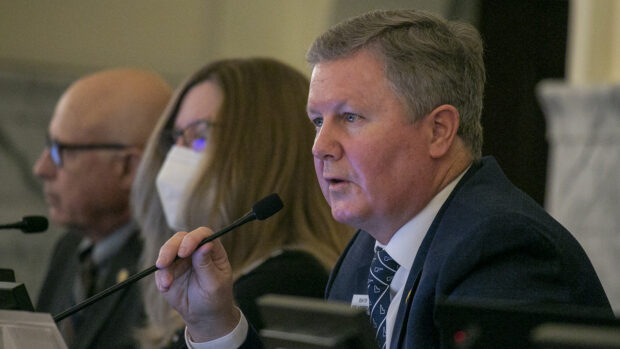This is part of a series of stories spotlighting some of Idaho’s most important legislative primaries. Check back for more stories before the May 21 election, and read previous stories here.
Nampa Republican voters will soon decide between two familiar Senate candidates in a primary race that’s shaping up to be just as rancorous as the last one.
GOP rivals Sen. Brian Lenney and former Sen. Jeff Agenbroad are facing off in a rematch of the 2022 primary, when Agenbroad resoundingly lost in a bid for a fourth term. But there’s a key difference this year: Lenney now has a voting record after two legislative sessions, and Agenbroad is highlighting it.
Lenney has called his opponent a “big spender” who rubber-stamped excessive state budgets during his Statehouse tenure. But Agenbroad says the incumbent’s immoderate resistance to spending has risked defunding services Nampans value, like public education.
“I have been extremely disappointed in the representation, or lack of representation, of Nampa values by Brian Lenney, and that’s really what’s putting me back in,” Agenbroad told Idaho Education News.
School choice, DEI top priorities for Lenney
As a member of the GOP’s minority hardline conservative wing, Lenney’s first term has been defensive. He’s tried to protect taxpayer money from what he deems as irresponsible spending and shield students from “woke indoctrination in Idaho education,” as he puts it on his website.
To those ends, Lenney has been a reliable vote against more moderate GOP education proposals — like Gov. Brad Little’s $71 million Idaho Launch workforce training scholarships. And he’s pushed to root out diversity, equity and inclusion (DEI) initiatives from colleges and universities, regularly opposing the institutions’ spending requests.
“I fought tooth and nail against bills draining taxpayer dollars into social justice and (diversity, equity and inclusion) positions across institutional offices,” Lenney says on his website.

DEI is a broad framework that describes anti-discrimination initiatives and programs popular on college campuses and in corporations. The State Board of Education maintains that Idaho universities don’t spend state dollars on DEI.
Lenney has also touted his support for bills that barred students from using school restrooms that don’t align with their birth sex and asserted parents’ rights to access their child’s school records and visit their classroom.
But the freshman lawmaker failed to pass most of his own education priorities — including a bill to ban college DEI programs.
A proponent of school choice, a catchall term that typically describes directing taxpayer funds to private education, Lenney sponsored a bill in 2023 to create universal education savings accounts (ESA) for private school tuition. The bill — co-sponsored with Sen. Tammy Nichols, R-Middleton — cleared the Senate Education Committee but died on the Senate floor amid concerns that it lacked accountability measures and a predictable price tag.
Lenney also proposed repealing the Blaine Amendment, a constitutional provision that bars taxpayer resources from benefitting religious schools. The proposal stalled in a House committee this year.
Lenney did not respond to interview requests for this story. But in EdNews’ voter guide, he said his top education priority is “expanding school choice options” for families.
The state already directs taxpayer funds to private education in other ways, Lenney noted. Existing state programs, like the Opportunity Scholarship and Empowering Parents, allow students and families to use public dollars for college tuition and private expenses, like tutoring. But no state money goes to K-12 private school tuition.
“I’d like to see this expanded to give parents and students more options when government schools aren’t a good fit,” Lenney said in the voter guide.
Meanwhile, Lenney has made waves as a firebrand who frequently clashes with GOP leaders. He has fervently opposed Launch, calling it a form of socialism. “Free, state-funded workforce training is a form of central planning, which is what countries like North Korea, China and Cuba practice,” he said in the voter guide.
Lenney is a “proud member” of the Idaho Freedom Caucus, a group of hardline Statehouse conservatives. The caucus typically doesn’t have sufficient numbers to advance its agenda but occasionally plays spoiler to more moderate GOP proposals, like this year’s unsuccessful library bill. Lenney supported the more stringent legislation, House Bill 710, that ultimately passed and made libraries liable for statutory fines and lawsuits stemming from book challenges.
“I’ve been consistent in my voting, standing up for what I believe in, even when it ruffles some feathers,” Lenney says on his website.
In private life, Lenney works in direct response copywriting, a type of internet marketing that compels immediate purchases of products or services. And he’s written children’s books on topics such as “how awesome” assault rifles are and “why feminism is so silly.”
On social media, Lenney is known to critique or lampoon political foes and weigh in on hot-button topics, from immigration to LGBTQ+ issues. In recent months, he cast doubt on the claims that the University of Utah women’s basketball team faced harassment in Coeur d’Alene — an investigation found that an 18-year-old white man yelled a racist slur at the team but a local prosecutor declined to file charges. And Lenney said the Biden administration “went full retard” for an initiative to counter Islamaphobia. 
The latter tweet contributed to Senate leadership stripping him of his vice chairman position on the Senate Commerce and Human Resources Committee, according to Lenney. In November, Senate President Pro Tem Chuck Winder, R-Boise, told Lenney he would no longer serve in the role, after he had “aggressively attacked, disparaged, and degraded” fellow lawmakers and members of the general public.
“Where’s the list of words we can and can’t say? People we can and can’t criticize?” Lenney said on X, the platform formerly known as Twitter.
Agenbroad eyes facilities funding tweaks, accountability for private school aid
Agenbroad was near the top of Idaho’s political ladder when he slipped in 2022. As co-chair of the powerful Joint Finance-Appropriations Committee, he had significant power over state spending.
The Nampa native was one of 20 Republican incumbents that voters dismissed in the last primary election. At the time, Agenbroad was outspoken about third-party influences on his race and others. He also believes Nampa’s growing population cost him his seat — name recognition loses its sway, even for a fifth-generation Idahoan, when so many voters are newcomers.
“What I’ve had to do this go-around is, really, reintroduce myself to my hometown,” Agenbroad said in an EdNews interview.
If elected, Agenbroad said he hopes to pick up where he left off reforming school facilities funding. He was part of a 2022 interim committee that studied Idaho’s pressing needs to better fund buildings. He helped come up with a plan directing $61 million in state endowment money to districts’ construction and maintenance costs, but hardliners on Senate Education — including Lenney — rejected it in 2023.
Agenbroad said he’d push for amendments to this year’s House Bill 521, so the $1.5 billion in new money makes a “meaningful difference” for small, rural school districts. Idaho’s smallest districts will see marginal benefit from the HB 521’s distribution formula, which is weighted based on attendance.
“That’s going to take it out of the bigger schools’ pockets, which I’m not necessarily a big fan of,” he said. “But I think it’s the cost versus the benefit when we’re talking about all Idaho schools.”
Lenney opposed HB 521 over concerns that its various facets violated Idaho’s constitutional provision limiting bills to one subject. Several other lawmakers — both Republicans and Democrats — shared the same concerns.
Agenbroad said he supports Launch and said he’s a proponent of school choice, but the state needs to address a few things before funding a voucher, ESA or tax credit program. First, voters should decide whether to repeal the Blaine Amendment. Then, the Legislature needs to increase education spending, rather than siphoning to private education what’s currently available to public schools. And lastly, there must be accountability measures in place to track the money.
“Every public tax dollar, in my opinion, should have accountability to the public,” he said. “What is that going to look like?”

Agenbroad is a banker and businessman by trade, which made him a natural fit to chair the Legislature’s budget committee. But Agenbroad’s oversight of the committee amid the COVID-19 pandemic — when the state spent an unprecedented amount of money, buoyed by federal aid — has been the primary target for attacks from rivals.
During Agenbroad’s one session as JFAC co-chair, the Legislature appropriated $12.9 billion, a 14.5% increase from the prior fiscal year. Forty-three percent of those appropriations were from federal funds. Lenney and his Idaho Freedom Foundation allies have called Agenbroad a “big spender,” who was unwilling to scrutinize budgets “bloated” with federal money borrowed from future generations.
Agenbroad has rebuked those criticisms, arguing he approved budgets only after they went through “thousands of hours” of vetting and noting that he supported four different tax cuts. Agenbroad said he agrees that the federal government has a spending problem. But out-and-out rejecting budgets as Lenney has — for public education, law enforcement and even a state school for the deaf and blind — is a “ridiculous” way to fix it.
“It’s really easy to stand back and say, ‘I don’t like this or I don’t like that,’” he said. “What do you like and why aren’t you involved in coming up with a better budget?”
Who’s supporting whom? A look at endorsements and donations
Lenney defeated Agenbroad last election by 15.2%, or 832 votes. The successful campaign framed Lenney as a “blue-state refugee” growing increasingly concerned that Idaho’s politics was trending liberal like California’s, his home state.
The campaign also had third-party support from conservative groups like Idaho Freedom Action, the political arm of the Idaho Freedom Foundation. Lenney has scored high marks from the think tank that rates lawmakers based on their adherence to IFF’s bill ratings.
While Lenney in his first term had straight A’s from the group, Agenbroad received failing grades as a legislator, and Idaho Freedom Action is again backing his opponent. Doyle Beck and Bryan Smith, IFF board members from Idaho Falls, donated to Lenney’s 2024 campaign. And Idaho Freedom Action has financed recent advertising slamming Agenbroad’s “liberal voting record.”
For his own part, Lenney has accused Agenbroad of being a “yes man,” who helps corporations benefit from a government subsidy “gravy train.” Industry lobbyists are “pushing hard to install legislators who will keep the money flowing,” Lenney wrote in a recent column. “The only barrier? True conservative fighters.”
But Agenbroad has embraced his industry support, which includes campaign donations from agriculture (Idaho Farm Bureau, Wheat and Barley PAC, Simplot), development (Ball Ventures) and the insurance sector (United Heritage), among others. The Idaho Association of Commerce and Industry, a powerful business lobbying group, endorsed Agenbroad’s campaign in October.
While Lenney is “more of an activist” than a legislator, “I’m a proven commodity to them,” Agenbroad said. “I’ve proven that we don’t always agree on everything because I’m not beholden to any particular group.”
Agenbroad touted his farm industry supporters, who “recognize that Sen. Lenney is not supportive of agriculture, despite what he says.”
Agenbroad allies are spending heavily on his campaign. The Idaho Liberty PAC last month spent roughly $50,000 on advertising in the contest — mostly in opposition to Lenney — and has continued its spending in May. Robert Jones is the registered chair of the political action committee. Its largest donor is the Idaho Victory Fund, a separate committee registered to Ysabel Bilbao of Bilbao and Co., a Boise public relations firm.
Two high-ranking state officials also have weighed in on the race. This week, Attorney General Raúl Labrador endorsed Lenney, and State Superintendent of Public Instruction Debbie Critchfield endorsed Agenbroad.
Lenney “has been on the front lines fighting…excessive spending,” while Agenbroad “consistently approved bloated budgets,” Labrador said.
Critchfield lauded Agenbroad’s record on education and support for “fiscally responsible solutions to meet our achievement goals for our state.”
